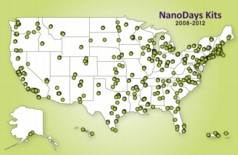Home > Press > Get ready for NanoDays!
 |
| While several communities conducted NanoDays events in prior years, the first nationwide week of events took place in 2008 with more than 100 institutions participating. This has grown to more than 225 events over the past few years. |
Abstract:
At the end of next month, hundreds of museums, science centers, and university research centers across the United States will be hosting events to help children and adults explore the tiny world of atoms, molecules, and nanoscale forces. These events are part of NanoDays, a weeklong, nationwide festival of educational programs about nanoscale science, engineering, and technology.
Get ready for NanoDays!
Boston, MA | Posted on February 14th, 2013NanoDays, organized by the Nanoscale Informal Science Education Network (NISE Net), will take place nationally from March 30 to April 7, 2013. These community-based events collectively make up the largest public outreach effort in nanoscale informal science education. Over 300 science museums, research centers, and universities across the United States are involved, from Puerto Rico to Alaska.
NanoDays events bring scientists and researchers together with science educators to engage people of all ages in learning about this emerging field, which holds the promise of developing revolutionary materials and technologies. Most NanoDays events combine fun hands-on activities with presentations on current research. A range of exciting NanoDays programs demonstrate the special and unexpected properties found at the nanoscale, examine tools used by nanoscientists, showcase nano materials with spectacular promise, and invite discussion of technology and society.
Local communities experience many of these activities firsthand at museum and research institutions. Visitors can explore how 3D images are made, investigate new nano products and materials, and imagine what the world might look like if we could build an elevator to space! Other activities include making bracelets that change color in the sun and a storytime reading of Dr. Seuss's Horton Hears a Who!
####
About NISE Network
The NISE Network is led by 14 organizations, and includes hundreds of museums and universities across the nation. Originally launched in 2005 with funding from the National Science Foundation to the Museum of Science in Boston, and its lead partners—the Science Museum of Minnesota and the Exploratorium, the NISE Network was awarded a second five-year $21 million grant in 2010. This second grant allows partners to continue to find ways to engage public audiences in this cutting edge science and technology into the next decade.
NISE Network lead organizations include:
Association of Science-Technology Centers, Inc. in Washington, DC
Children’s Museum of Houston in Houston, TX
Exploratorium in San Francisco, CA
Franklin Institute in Philadelphia, PA
Lawrence Hall of Science in Berkeley, CA
Materials Research Society in Warrendale, PA
Museum of Life + Science in Raleigh-Durham, NC
Museum of Science in Boston, MA
New York Hall of Science in Queens, NY
Oregon Museum of Science and Industry in Portland, OR
Sciencenter in Ithaca, NY
Science Museum of Minnesota in St. Paul, MN
SRI International in Menlo Park, CA
For more information about NISE Net, NanoDays, and how to get involved, please visit:
www.nisenet.org/nanodays
To see a listing of (regularly updated) 2013 NanoDays events nationwide, please visit: www.nisenet.org/nanodays/participants-2013
For general information about nanoscience, engineering, and technology, please visit:
www.whatisnano.org
For more information, please click here
Copyright © NISE Network
If you have a comment, please Contact us.Issuers of news releases, not 7th Wave, Inc. or Nanotechnology Now, are solely responsible for the accuracy of the content.
| Related News Press |
News and information
![]() Researchers develop molecular qubits that communicate at telecom frequencies October 3rd, 2025
Researchers develop molecular qubits that communicate at telecom frequencies October 3rd, 2025
![]() Next-generation quantum communication October 3rd, 2025
Next-generation quantum communication October 3rd, 2025
![]() "Nanoreactor" cage uses visible light for catalytic and ultra-selective cross-cycloadditions October 3rd, 2025
"Nanoreactor" cage uses visible light for catalytic and ultra-selective cross-cycloadditions October 3rd, 2025
Academic/Education
![]() Rice University launches Rice Synthetic Biology Institute to improve lives January 12th, 2024
Rice University launches Rice Synthetic Biology Institute to improve lives January 12th, 2024
![]() Multi-institution, $4.6 million NSF grant to fund nanotechnology training September 9th, 2022
Multi-institution, $4.6 million NSF grant to fund nanotechnology training September 9th, 2022
Announcements
![]() Rice membrane extracts lithium from brines with greater speed, less waste October 3rd, 2025
Rice membrane extracts lithium from brines with greater speed, less waste October 3rd, 2025
![]() Researchers develop molecular qubits that communicate at telecom frequencies October 3rd, 2025
Researchers develop molecular qubits that communicate at telecom frequencies October 3rd, 2025
![]() Next-generation quantum communication October 3rd, 2025
Next-generation quantum communication October 3rd, 2025
![]() "Nanoreactor" cage uses visible light for catalytic and ultra-selective cross-cycloadditions October 3rd, 2025
"Nanoreactor" cage uses visible light for catalytic and ultra-selective cross-cycloadditions October 3rd, 2025
Events/Classes
![]() Institute for Nanoscience hosts annual proposal planning meeting May 16th, 2025
Institute for Nanoscience hosts annual proposal planning meeting May 16th, 2025
![]() A New Blue: Mysterious origin of the ribbontail ray’s electric blue spots revealed July 5th, 2024
A New Blue: Mysterious origin of the ribbontail ray’s electric blue spots revealed July 5th, 2024
![]() Researchers demonstrate co-propagation of quantum and classical signals: Study shows that quantum encryption can be implemented in existing fiber networks January 20th, 2023
Researchers demonstrate co-propagation of quantum and classical signals: Study shows that quantum encryption can be implemented in existing fiber networks January 20th, 2023
|
|
||
|
|
||
| The latest news from around the world, FREE | ||
|
|
||
|
|
||
| Premium Products | ||
|
|
||
|
Only the news you want to read!
Learn More |
||
|
|
||
|
Full-service, expert consulting
Learn More |
||
|
|
||








